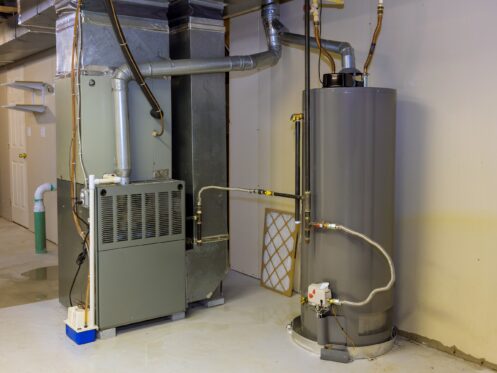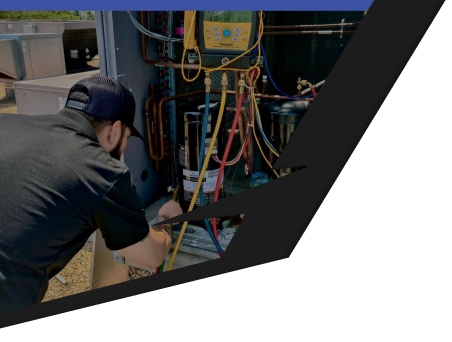Heating systems account for nearly half the energy used in most homes, with outdated equipment potentially wasting up to 30 percent of the fuel consumed. Among heating options, boilers stand out as one of the more efficient. A water-based system distributes heat evenly and maintains comfortable temperatures with. An efficient boiler uses less fuel than most forced-air designs to produce the same heat, reducing your monthly utility bills and carbon footprint.
How do you find the right boiler for your place based on efficiency? Let’s look at boiler efficiency, the available types, and factors affecting performance, courtesy of our heating services experts.
How Boiler Efficiency Is Measured
Boiler efficiency refers to how effectively a system converts fuel into usable heat for your home. The standard measurement for efficiency is AFUE (Annual Fuel Utilization Efficiency). This number tells you what percentage of fuel becomes heat rather than being lost during operation. For example, a boiler with a 90-percent AFUE rating converts 90 percent of its fuel into heat. Only 10 percent escapes as waste heat. For every dollar you spend on fuel, 90 cents goes toward heating your home.
Several factors affect a boiler’s efficiency, including its design, fuel type, installation quality, maintenance and age. Modern high-efficiency boilers typically achieve AFUE ratings of 90 to 98 percent, compared to older models that might operate at just 55 to 70 percent efficiency. The difference can translate to hundreds of dollars a year in savings.
Thermal efficiency (TE) measures how well heat transfers from combustion gases to water. This metric becomes particularly important when comparing similar high-performance systems, as it accounts for heat losses within the heat exchange process. A 95 percent TE rating translates to 95 percent of the energy converting into heat when the boiler operates.
Be mindful that AFUE measures overall performance from start to finish in a cycle. It measures waste from the initial heat-up, the active cycle and the cool-down. This is good for understanding the total cost of owning a specific boiler model. TE is more specific to peak performance, giving you a better idea of how well the boiler’s efficiency translates to resulting warmth.
Types
Atmospheric Boilers
Atmospheric boilers are the most conventional models. They use a natural draft system that pulls air through the combustion chamber and vents exhaust gases through a flue. Atmospheric boilers typically feature a standing pilot light that burns continuously, even when the boiler isn’t actively heating.
These are older systems that generally achieve AFUE ratings between 80 to 85 percent, making them significantly less efficient than modern alternatives. Their lower efficiency stems primarily from heat loss through the flue and the constant energy consumption of a pilot light on standby.
Condensing Boilers
Condensing boilers are a leap forward in heating efficiency. They capture heat that would otherwise escape up the flue. Unlike conventional models, they feature a secondary heat exchanger to extract additional thermal energy from exhaust gases. Their superior performance comes from recovering latent heat by allowing water vapor in the flue gases to condense into liquid form. The cooled exhaust gases exit at much lower temperatures, encouraging more heat to stay in your home.
Condensing boilers typically achieve AFUE ratings of over 90 percent, with many newer models hitting 95 percent or higher. Expect heating billsto bee lower by 15 to 30 percent compared to conventional models. Notably, a condensing system produces acidic condensate water. Consequently,a draine needs to beinstalledn. A neutralization system for the acidic water might also be necessary.
Combination Boilers
Combination boilers serve two purposes, providing indoor heating and on-demand hot water. A combi boiler means your house won’t need a separate water heater.
Combi boilers typically perform efficiently when operating in heating mode like standard condensing models. However, their hot water efficiency can vary based on usage patterns. While they eliminate standby heat losses associated with storage tanks, they may run less efficiently during frequent short periods of hot water use.
Combi boilers offer excellent overall efficiency for households with moderate hot water demands. However, homes requiring simultaneous hot water use in several rooms might experience some efficiency trade-offs compared to using a standalone water heater.
Hybrid Boilers
Hybrid heating systems pair boilers with electric heat pumps to maximize efficiency. The heat pump handles most heating duties during cool or moderate temperatures. The boiler automatically activates during the coldest periods when heat pump performance decreases. Heat pumps can achieve 300 to 400 percent efficiency ratings in mild weather. The heat pump component can exceed 100 percent because it’s moving heat rather than generating it.
Hybrid systems are particularly effective in regions with fluctuating temperatures, like Texas. The heat pump can handle most heating needs efficiently, while the boiler serves as backup during occasional cold snaps.
Considerations
A boiler’s efficiency depends heavily on correct sizing. Oversized boilers cycle too frequently, wasting fuel and causing unnecessary wear. Undersized units run constantly and struggle to maintain comfortable temperatures. Precise home measurements will prevent performance problems and higher operating costs associated with improper sizing.
Annual boiler maintenance also preserves efficiency throughout a system’s lifespan. Without regular heating maintenance service, boiler efficiency can decline by five percent annually, dramatically increasing fuel consumption and costs. Essential maintenance tasks include cleaning heat exchangers and burners, checking combustion efficiency, testing safety controls, inspecting vents for obstructions and verifying proper water pressure.
Modern control systems significantly impact boiler efficiency. Programmable and smart thermostats allow precise scheduling based on occupancy patterns, preventing wasted energy from heating empty rooms. Similarly, zoning systems divide your home into independently controlled areas, allowing you to heat only occupied spaces while reducing temperatures in unused zones.
Even the most efficient boiler wastes fuel when heating a poorly insulated home. Proper insulation in your attic will dramatically reduce heat loss, allowing your boiler to work less. The layout of radiators or hydronic floor heating will also affect the overall system’s efficiency. Again, there must be enough opportunity for heat to reach each room without becoming redundant.
Choosing a Boiler
Condensing boilers are the winners regarding fuel efficiency relative to upfront costs. The top models have AFUE ratings that commonly reach 98 percent. Their ability to extract latent heat from exhaust gases through condensation gives them a substantial advantage.
Combi condensing boilers offer excellent efficiency for homes with moderate hot water demands. Subtracting the water heater from the equation is a big win, especially if you’re trying to make the most of limited space.
A hybrid boiler is the way to go if you want maximum efficiency without regard to the upfront cost. Conventional atmospheric boilers have low upfront costs but are inefficient because they’ll cost you more money within several years.
Cool Experts AC serves the households and businesses of Richardson, Plano, Allen and other nearby communities in Texas with expert boiler services including installation, repair, and maintenance. Our company is licensed by the state and accredited by the BBB. Thumbtack has also named us a Top Pro.
If you’re trying to understand boiler efficiency, contact Cool Experts AC to discuss the available options.


